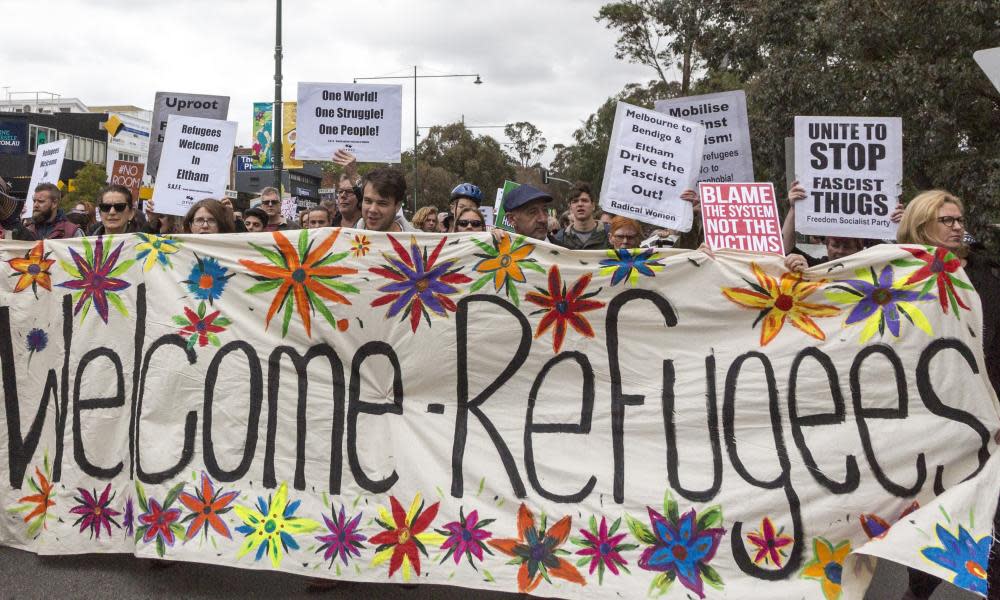Australia's human rights record attacked in global report for 'serious shortcomings'

The Australian government must act on the “serious shortcomings” in its human rights record if it wants to be a credible leader on the global stage, Human Rights Watch has said in its annual world report.
The Australian chapter of the HRW world review said that despite a strong tradition of protecting civil and political rights, “Australia has serious unresolved human rights problems” and a concerning track record on assessing other nations.
Australia was elected to the UN Human Rights Council in October for a term of three years, pledging to prioritise freedom of expression, Indigenous rights, gender equality, good governance and national human rights institutions.
But it needed to address “serious shortcomings” in its own human rights record if it wanted to be a credible leader on the world stage, said Human Rights Watch Australia director, Elaine Pearson.
“Sitting on the Human Rights Council will put Australia’s rights record under greater international scrutiny, so the government needs to act now to reverse its human rights failings.”
While noting Australia had made progress in legalising same-sex marriage – albeit with “not an acceptable decision-making method” – and in taking steps to end abuse in juvenile detention centres, the report criticised a number of other areas.
“Indigenous Australians are overrepresented in the criminal justice system. Half the prison population has a disability, and inmates face violence, neglect and extended periods of isolation. Abuses in juvenile detention centres and over-broad counterterrorism laws persist,” it said.
Australia was “undeterred” by United Nations calls to end offshore processing, and “maintained its cruel practice of warehousing asylum seekers in abysmal conditions”, where detainees faced violence and unnecessary delays in medical care, it said.
It made mention of the Nauru and Australian governments for ignoring doctors’ recommendations and blocking medical transfers for nearly 50 people.
The Australian government had demonstrated a lack of transparency about its involvement in airstrikes against Isis and the subsequent civilian casualties, and about its weapons sales in the Middle East, the report continued.
“Australia has approved military exports to Saudi Arabia, despite concerns about alleged war crimes by the Saudi-led coalition in Yemen. Australia has not released information on the types or quantities of equipment sold.”
Australia had also introduced “draconian” laws in response to concerns over home-grown terrorism and was yet to implement recommendations and reforms to address Indigenous incarcerations and deaths in custody and the rights of prisoners with disabilities.
Among the cases highlighted by HRW, Western Australia had failed to end its policy of jailing people for unpaid fines, a recommendation from a coronial inquiry into the preventable death in custody of 22-year-old Ms Dhu.
The WA government had also failed to enact any reforms following a UN review of the case of Marlon Noble, who was “deprived of liberty without trial” when jailed for more than 10 years after being declared unfit to stand trial.
HRW itself had conducted research in 14 prisons across WA and Queensland, finding people with disabilities – half the prison population – experienced bullying, harassment, physical and sexual violence from other prisoners and staff.
“Due to a lack of staff sensitivity and training, prisoners with disabilities are frequently punished for behaviour resulting from their disability and end up disproportionately represented in punishment units,” it said.
The report also criticised Australia’s record as a United Nations member state, saying it had “acted inconsistently and rarely showed leadership at the UN on human rights issues relating to particular countries”.
“During the year Australia rarely raised human rights issues publicly in countries it works closely with on border security or trade, such as China, Cambodia, and Vietnam, preferring to engage in ‘quiet diplomacy’,” the report said.
“In October, Australia deepened diplomatic ties with Cambodia while ignoring its sharp crackdown on civil and political rights. In November, it upgraded diplomatic relations with Vietnam despite its escalating crackdown on freedom of expression.”
The report, released on Thursday, was the 28th issued by HRW reviewing human rights in more than 90 countries.

 Yahoo News
Yahoo News 
